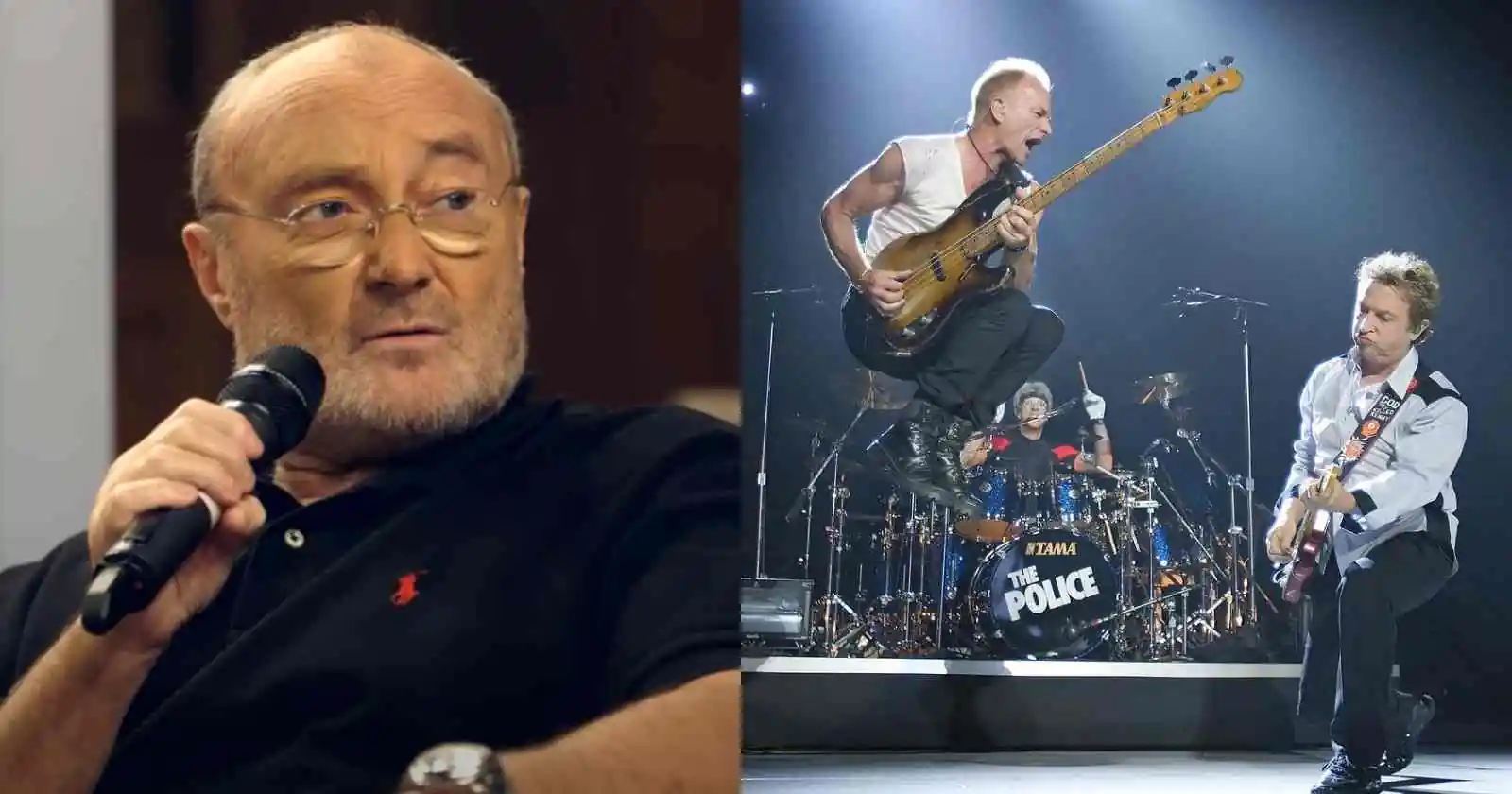Phil Collins first achieved fame as the drummer of the legendary British Progressive Rock Genesis in the 70s and after Peter Gabriel left he was forced to become the group’s vocalist. In the following years he decided to start a solo career to play and sing a different kind of music that didn’t suited Genesis at the time.
The result is that Collins became one of the few artists that were able to sell an estimated amount of 100 million records worldwide both as a member of a band and as a solo artist.
He had always praised bands and artists from the 50s and 60s as some of his biggest influences but he was always paying attention to new bands that appeared on the scene. Over the decades he talked about many of his peers, including The Police and their drummer Stewart Copeland.
What is Phil Collins’ opinion on The Police and Stewart Copeland
One of the most famous power trios of music, The Police was formed by Sting (Bass and vocals), Andy Summers (Guitar) and Stewart Copeland (Drums) in 1977.
They released their debut album “Outlandos d’Amour” one year later, making them one of the emerging acts of the so called “New Wave”. The band would still record four other albums “Reggatta de Blanc” (1979), “Zenyatta Mondatta” (1980), “Ghost in the Machine” (1981) and “Synchronicity” (1983).
In 1983 in an interview with Modern Drummer magazine, the same year that The Police released their final studio album, Phil Collins cited them as one of his favorite new bands but said that the drummer Stewart Copeland had a huge ego.
“I like the Sex Pistols. I thought they made great records. They had a lot of energy and the records sounded great. I’ve got some at home on the jukebox. But, I mean, they’re the figurehead of that period and they sounded good. But then there was also just a lot of crap when everybody was deliberately detuning their guitars and deliberately singing out of tune. With the coming of people like Elvis Costello, The Police and probably a few others I’m not aware of, that Punk thing started to become more sophisticated. That’s when I started getting interested in it.”
“The Police are one of my favorite bands. I mean, Stewart Copeland’s got an ego of the size of this hotel, but he can play. There are lots of bands like Culture Club, Wazoo and ABC, all that. Some of the records are good, some leave me cold. This fashion thing goes in fits and starts.”
Phil Collins continued:
“The fashion to dance, now you know, it’s respectable disco, I suppose you call it. But it’s not love songs. I mean, I write love songs, really. Very unfashionable thing to do. If you look like Boy George you can sing a love song like “Do You Really Want To Hurt Me’. If you’re me and you sing a song like that, you’re accused of being middle-aged. It’s peculiar set of affairs,” Phil Collins said.
The Genesis drummer and vocalist had said practically the same thing about The Police in a conversation with David Sheff. In that interview he revealed that Sting became good friend.
“A great band. That is, I think they’re still together. They have a love-hate relationship. Depending on who you talk to, one of them is always leaving the band. Stewart Copeland is an amazing drummer. I just wish he didn’t think he was amazing. Sting is a lovely bloke. We’ve become friends. I felt honored to be on stage with him at Live Aid,” Phil Collins said.
There was even a possibility that they would tour together around 2016 when Phil Collins came out of retirement. In an interview with Entertainment Weekly he was asked if he knew that Sting and his old bandmate Peter Gabriel would tour together that year. Collins was surprised and said that he didn’t know that until at the moment and that Sting talked with his manager not long before that.
“Sure, (I am) good friends — of both. [Laughs] I didn’t know [about the tour]. At one point, Sting was talking to my manager. Now I find out Pete’s doing it! I would go see them, of course. Probably what would happen is, I’d end up singing with both on stage. Let’s see,” Collins said at the time.
They worked with the same producer
Curiously, The Police worked with the producer who worked with Phil Collins on his first sucessful solo records. Hugh Padgham produced alongside Collins the albums “Face Value” (1980), “Hello, I Must Be Going!” (1982), “No Jacket Required” (1985), “…But Seriously” (1989) and “Dance into the Light” (1996).
Padgham was demanded by many bands in the 80s that wanted to take another step on their sound, especially to make hit albums. So he worked with The Police on their final two albums “Ghost in the Machine” (1981) and “Synchronicity” (1983).
Those records had huge hit songs like “Spirits in the Material World”, “Every Little Thing She Does Is Magic”, “Every Breath You Take” and “King of Pain”. After the end of the band Padgham still worked with Sting on many of his solo records.

